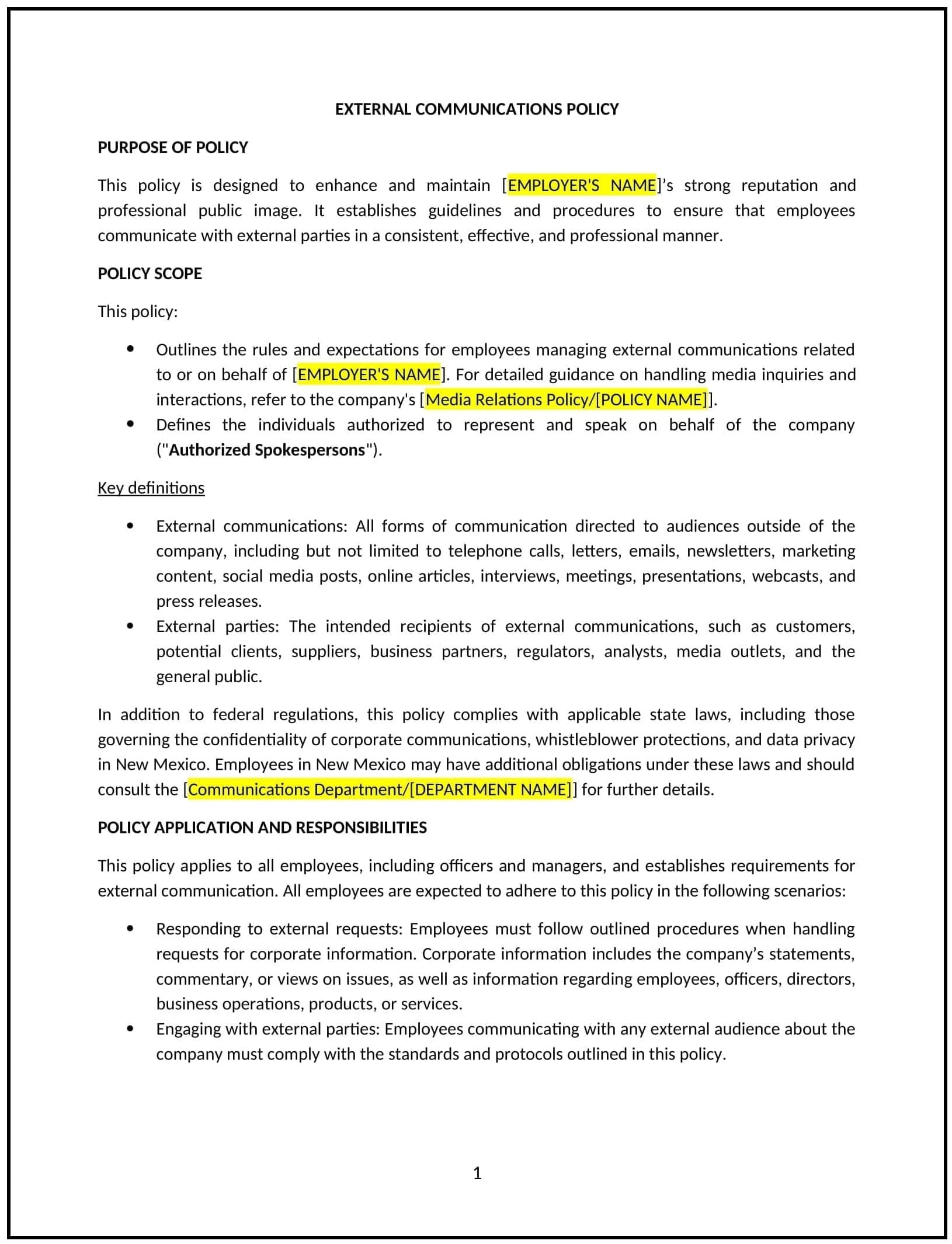External communications policy (New Mexico): Free template
Got contracts to review? While you're here for policies, let Cobrief make contract review effortless—start your free review now.

Customize this template for free
External communications policy (New Mexico)
This external communications policy is designed to help New Mexico businesses manage how they communicate with external stakeholders, including customers, suppliers, the media, regulatory bodies, and the general public. The policy outlines who is authorized to speak on behalf of the company, the guidelines for handling communications, and the procedures for maintaining a consistent and professional public image.
By adopting this policy, New Mexico businesses can ensure that all external communications are aligned with the company’s values, protect the brand’s reputation, and minimize the risk of miscommunication or legal issues.
How to use this external communications policy (New Mexico)
- Define authorized spokespersons: Specify who is authorized to communicate on behalf of the business. This may include the CEO, PR team, marketing department, or designated spokespeople who have received appropriate training.
- Establish communication channels: Identify the preferred channels for external communication, such as social media, press releases, emails, websites, and public speaking engagements. The policy should outline which channels should be used for different types of communications.
- Set guidelines for messaging: Provide clear guidelines for creating messages that reflect the company’s brand, mission, and values. This includes maintaining consistency in tone, language, and the message’s core content.
- Address crisis communication: Define the process for managing communications during a crisis or emergency, such as a public relations issue or a product recall. Specify who will be involved in responding to the situation and how information will be disseminated to the public.
- Reflect New Mexico-specific considerations: Consider any state-specific laws or regulations regarding external communications, such as those related to advertising, transparency, or disclosures that may be relevant in New Mexico.
Benefits of using this external communications policy (New Mexico)
Implementing this policy provides New Mexico businesses with several advantages:
- Protects the company’s reputation: Clear guidelines help ensure that all external communications are consistent, professional, and aligned with the company’s values, which helps to protect the business’s public image.
- Reduces the risk of miscommunication: By setting specific guidelines for external communication, businesses can minimize the risk of misinterpretation, which could lead to legal issues or damage to relationships with customers, suppliers, or the media.
- Enhances brand consistency: A consistent message across all external communications strengthens the business’s brand identity and helps create trust with customers and partners.
- Improves crisis management: Having an established process for crisis communication ensures that the business can respond quickly and effectively during a crisis, limiting damage to the company’s reputation.
- Promotes legal protection: By establishing clear protocols for external communications, businesses reduce the risk of violating any New Mexico state or federal laws regarding advertising, misinformation, or public disclosure.
Tips for using this external communications policy (New Mexico)
- Communicate the policy to all relevant employees: Ensure that employees understand who is authorized to communicate with external parties and what channels to use for specific types of communications.
- Train employees on communication best practices: Regularly train employees involved in external communications on the company’s key messages, tone of voice, and appropriate use of communication channels.
- Monitor communications: Implement a system to monitor external communications, especially on social media, to ensure that all messages align with the company’s standards and values.
- Establish a process for crisis communication: Be prepared for potential crises by developing a crisis communication plan that includes predefined messages, spokespersons, and steps to manage public relations issues effectively.
- Regularly review and update the policy: Periodically review the external communications policy to ensure it remains relevant to New Mexico laws, business objectives, and changes in communication technology or media landscape.